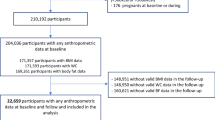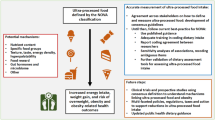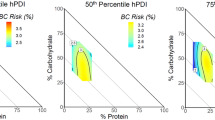Abstract
Purpose
Although a high-carbohydrate diet typically shows low-fat intake, the prevalence of metabolic abnormalities in Asian countries has increased. We evaluated three types of a high-carbohydrate diet and its association with cardiometabolic risk factors in the Korean adult population.
Methods
A total of 14,438 adults (5813 men and 8625 women) who participated in the 2008–2012 Korea National Health and Nutrition Examination Surveys were selected. Dietary data were obtained by a single 24-h recall method. High-carbohydrate diets were defined using three carbohydrate variables, including total carbohydrate intake, proportion of energy from carbohydrate, and white rice consumption as dietary exposures. Cardiometabolic risk factors included obesity, abdominal obesity, hypercholesterolemia, atherogenic dyslipidemia, impaired fasting glucose, and elevated blood pressure. A multivariate-adjusted logistic regression was performed to examine the associations between high-carbohydrate diets and cardiometabolic risk factors by sex.
Results
Three types of high-carbohydrate diets showed different energy intakes and food group consumption when individuals in the highest quintile of each type were compared. In men, intakes of total carbohydrate and white rice were inversely associated with obesity, impaired fasting glucose, and elevated blood pressure and proportion of energy from carbohydrate and white rice consumption were inversely related to hypercholesterolemia. In women, a high consumption of white rice was positively associated with impaired fasting glucose. All three types of high-carbohydrate diets were positively associated with the prevalence of atherogenic dyslipidemia in both sexes.
Conclusions
Three types of high-carbohydrate diets show different associations with cardiometabolic risk factors except for unfavorable effects on atherogenic dyslipidemia.
Similar content being viewed by others
References
National Cholesterol Education Program (NCEP) Expert Panel on Detection, Evaluation, and Treatment of High Blood Cholesterol in Adults (Adult Treatment Panel III) (2002) Third Report of the National Cholesterol Education Program (NCEP) expert panel on detection, evaluation, and treatment of high blood cholesterol in adults (Adult Treatment Panel III) final report. Circulation 106:3143–3421
O’Neill S, O’Driscoll L (2015) Metabolic syndrome: a closer look at the growing epidemic and its associated pathologies. Obes Rev 16:1–12
Wei GS, Coady SA, Goff DC Jr, Brancati FL, Levy D, Selvin E et al (2011) Blood pressure and the risk of developing diabetes in African Americans and Whites: ARIC, CARDIA, and the Framingham Heart Study. Diabetes Care 34:873–879
AlEssa HB, Bhupathiraju SN, Malik VS, Wedick NM, Campos H, Rosner B et al (2015) Carbohydrate quality and quantity and risk of type 2 diabetes in US women. Am J Clin Nutr 102:1543–1553
Sluijs I, van der Schouw YT, van der A D, Spijkerman AM, Hu FB, Grobbee DE et al (2010) Carbohydrate quantity and quality and risk of type 2 diabetes in the European Prospective Investigation into Cancer and Nutrition-Netherlands (EPIC-NL) study. Am J Clin Nutr 92:905–911
Beulens JWJ, de Bruijne LM, Stolk RP, Peeters PHM, Bots ML, Grobbee DE et al (2007) High dietary glycemic load and glycemic index increase risk of cardiovascular disease among middle-aged women. J Am Coll Cardiol 50:14–21
Yu D, Shu XO, Li H, Xiang YB, Yang G, Gao YT et al (2013) Dietary carbohydrates, refined grains, glycemic load, and risk of coronary heart disease in Chinese adults. Am J Epidemiol 178:1542–1549
Mohan V, Radhika G, Sathya RM, Tamil SR, Ganesan A, Sudha V (2009) Dietary carbohydrates, glycaemic load, food groups and newly detected type 2 diabetes among urban Asian Indian population in Chennai, India (Chennai Urban Rural Epidemiology Study 59). Br J Nutr 102:1498–1506
Nanri A, Mizoue T, Noda M, Takahashi Y, Kato M, Inoue M et al (2010) Rice intake and type 2 diabetes in Japanese men and women: the Japan Public Health Center-based Prospective Study. Am J Clin Nutr 92:1468–1477
Yu D, Zhang X, Shu XO, Cai H, Li H, Ding D et al (2016) Dietary glycemic index, glycemic load, and refined carbohydrates are associated with risk of stroke: a prospective cohort study in urban Chinese women. Am J Clin Nutr 104:1345–1351
Schulze MB, Schulz M, Heidemann C, Schienkiewitz A, Hoffmann K, Boeing H (2008) Carbohydrate intake and incidence of type 2 diabetes in the European Prospective Investigation into Cancer and Nutrition (EPIC)-Potsdam Study. Br J Nutr 99:1107–1116
Sun Q, Spiegelman D, van Dam RM, Holmes MD, Malik VS, Willett WC et al (2010) White rice, brown rice, and risk of type 2 diabetes in US men and women. Arch Intern Med 170:961–969
McKeown NM, Meigs JB, Liu S, Saltzman E, Wilson PW, Jacques PF (2004) Carbohydrate nutrition, insulin resistance, and the prevalence of the metabolic syndrome in the Framingham Offspring Cohort. Diabetes Care 27:538–546
Feng R, Du S, Chen Y, Zheng S, Zhang W, Na G et al (2015) High carbohydrate intake from starchy foods is positively associated with metabolic disorders: a Cohort Study from a Chinese population. Sci Rep 5:16919
Villegas R, Liu S, Gao YT, Yang G, Li H, Zheng W et al (2007) Prospective study of dietary carbohydrates, glycemic index, glycemic load, and incidence of type 2 diabetes mellitus in middle-aged Chinese women. Arch Intern Med 167:2310–2316
Oba S, Nagata C, Nakamura K, Fujii K, Kawachi T, Takatsuka N et al (2010) Dietary glycemic index, glycemic load, and intake of carbohydrate and rice in relation to risk of mortality from stroke and its subtypes in Japanese men and women. Metabolism 59:1574–1582
Eshak ES, Iso H, Yamagishi K, Kokubo Y, Saito I, Yatsuya H et al (2014) Rice consumption is not associated with risk of cardiovascular disease morbidity or mortality in Japanese men and women: a large population-based, prospective cohort study. Am J Clin Nutr 100:199–207
Shi Z, Taylor AW, Hu G, Gill T, Wittert GA (2012) Rice intake, weight change and risk of the metabolic syndrome development among Chinese adults: the Jiangsu Nutrition Study (JIN). Asia Pac J Clin Nutr 21:35–43
Hu EA, Pan A, Malik V, Sun Q (2012) White rice consumption and risk of type 2 diabetes: meta-analysis and systematic review. BMJ 344:e1454
Korea Centers for the Disease Prevention and Control (2016) Korea Health Statistics 2015: Korea National Health and Nutrition Examination Survey (KNHANES VI-3). Ministry of Health and Welfare, Cheongju
U.S. Department of Agriculture, Agricultural Research Service (2016) Nutrient intakes from food and beverages: mean amounts consumed per individual, by gender and age, what we eat in America, NHANES 2013-2014. Food Surveys Research Group, Beltsville
Rippin HL, Hutchinson J, Jewell J, Breda JJ, Cade JE (2017) Adult nutrient intakes from current National Dietary Surveys of European populations. Nutrients 9:1288
U.S. Department of Agriculture, Agricultural Research Service (2016) Energy intakes: percentages of energy from protein, carbohydrate, fat, and alcohol, by gender and age, what we eat in America, NHANES 2013–2014. Food Surveys Research Group, Beltsville
Bates B, Lennox A, Prentice A, Bates C, Page P, Nicholson S et al (2014) National diet and nutrition survey: results from years 1, 2, 3 and 4 combined of the rolling program (2008/9–2011/12). Public Health England, London
Murakami K, Sasaki S, Takahashi Y, Okubo H, Hosoi Y, Horiguchi H et al (2006) Dietary glycemic index and load in relation to metabolic risk factors in Japanese female farmers with traditional dietary habits. Am J Clin Nutr 83:1161–1169
Rebello SA, Koh H, Chen C, Naidoo N, Odegaard AO, Koh WP et al (2014) Amount, type, and sources of carbohydrates in relation to ischemic heart disease mortality in a Chinese population: a prospective cohort study. Am J Clin Nutr 100:53–64
Kim K, Yun SH, Choi BY, Kim MK (2008) Cross-sectional relationship between dietary carbohydrate, glycaemic index, glycaemic load and risk of the metabolic syndrome in a Korean population. Br J Nutr 100:576–584
Ranasinghe P, Mathangasinghe Y, Jayawardena R, Hills AP, Misra A (2017) Prevalence and trends of metabolic syndrome among adults in the Asia-Pacific region: a systematic review. BMC Public Health 17:101
Nanditha A, Ma RC, Ramachandran A, Snehalatha C, Chan JC, Chia KS et al (2016) Diabetes in Asia and the Pacific: implications for the global epidemic. Diabetes Care 39:472–485
Kweon S, Kim Y, Jang MJ, Kim Y, Kim K, Choi S et al (2014) Data resource profile: the Korea National Health and Nutrition Examination Survey (KNHANES). Int J Epidemiol 43:69–77
National Rural Resources Development Institute (2006) Food composition table, 7th edn. Rural Development Administration, Suwon
Willett WC, Howe GR, Kushi LH (1997) Adjustment for total energy intake in epidemiologic studies. Am J Clin Nutr 65:1220S–1228S
The Korean Nutrition Society (2015) Dietary reference intakes for Koreans 2015. Ministry of Health and Welfare, Seoul
Song S, Jung HJ, Shim JE, Paik HY (2014) Assessment of food group intake in Korean population with a newly-developed food group database. J Food Comp Anal 36:72–78
International Obesity Taskforce (2000) The Asia-Pacific perspective: redefining obesity and its treatment. WHO Western Pacific Region, Sydney
Lee SY, Park HS, Kim DJ, Han JH, Kim SM, Cho GJ et al (2007) Appropriate waist circumference cutoff points for central obesity in Korean adults. Diabetes Res Clin Pract 75:72–80
Kajingulu M, Lepira B, Mbutiwi I, Makulo J, Bieleli E, Nseka M (2016) The atherogenic dyslipidemia ratio log (Tg)/Hdl-C was not associated with urinary albumin excretion rate (Uaer) and increased cardiovascular risk in Black patients with type 2 diabetes. World J Cardiovasc Dis 6:14–20
Choi H, Song S, Kim J, Chung J, Yoon J, Paik HY et al (2012) High carbohydrate intake was inversely associated with high-density lipoprotein cholesterol among Korean adults. Nutr Res 32:100–106
Song S, Song WO, Song Y (2017) Dietary carbohydrate and fat intakes are differentially associated with lipid abnormalities in Korean adults. J Clin Lipidol 11:338–347
Saneei P, Larijani B, Esmaillzadeh A (2017) Rice consumption, incidence of chronic diseases and risk of mortality: meta-analysis of cohort studies. Public Health Nutr 20:233–244
Song S, Lee JE, Song WO, Paik HY, Song Y (2014) Carbohydrate intake and refined-grain consumption are associated with metabolic syndrome in the Korean adult population. J Acad Nutr Diet 114:54–62
Song Y, Joung H (2012) A traditional Korean dietary pattern and metabolic syndrome abnormalities. Nutr Metab Cardiovasc Dis 22:456–462
Kim J, Jo I (2011) Grains, vegetables, and fish dietary pattern is inversely associated with the risk of metabolic syndrome in South Korean adults. J Acad Nutr Diet 111:1141–1149
Eshak ES, Iso H, Date C, Yamagishi K, Kikuchi S, Watanabe Y et al (2011) Rice intake is associated with reduced risk of mortality from cardiovascular disease in Japanese men but not women. J Nutr 141:595–602
Wu Y, Qian Y, Pan Y, Li P, Yang J, Ye X et al (2015) Association between dietary fiber intake and risk of coronary heart disease: a meta-analysis. Clin Nutr 34:603–611
Chen JP, Chen GC, Wang XP, Qin L, Bai Y (2017) Dietary fiber and metabolic syndrome: a meta-analysis and review of related mechanisms. Nutrients 10:24
de Munter JS, Hu FB, Spiegelman D, Franz M, van Dam RM (2007) Whole grain, bran, and germ intake and risk of type 2 diabetes: a prospective cohort study and systematic review. PLoS Med 4:e261
Lee S (2011) Association of whole grain consumption with socio-demographic and eating behavior factors in a Korean population: based on 2007–2008 Korea National Health and Nutrition Examination Survey. Korean J Community Nutr 16:353–363
Lee HS, Kwon SO, Yon M, Kim D, Lee JY, Nam J et al (2014) Dietary total sugar intake of Koreans: based on the Korea National Health and Nutrition Examination Survey (KNHANES), 2008–2011. J Nutr Health 47:268–276
Kang Y, Kim J (2017) Soft drink consumption is associated with increased incidence of the metabolic syndrome only in women. Br J Nutr 117:315–324
Kwak JH, Jo G, Chung HK, Shin MJ (2018) Association between sugar-sweetened beverage consumption and incident hypertension in Korean adults: a prospective study. Eur J Nutr. https://doi.org/10.1007/s00394-018-1617-1
Song HJ, Paek YJ, Choi MK, Yoo KB, Kang JH, Lee HJ (2017) Gender differences in the relationship between carbonated sugar-sweetened beverage intake and the likelihood of hypertension according to obesity. Int J Public Health 62:573–581
Song S, Kim J, Kim J (2018) Gender differences in the association between dietary pattern and the incidence of hypertension in middle-aged and older adults. Nutrients 10:252
Vlassoff C (2007) Gender differences in determinants and consequences of health and illness. J Health Popul Nutr 25:47–61
Willett WC (2013) Nutritional epidemiology, 3rd edn. Oxford University Press, New York
Funding
This study was supported by a National Research Foundation of Korea (NRF) Grant funded by the Korean Government (NRF-2017R1A2B1008420).
Author information
Authors and Affiliations
Corresponding author
Ethics declarations
Ethical standards
The study was conducted in accordance with the 1964 Declaration of Helsinki and its later amendments and was approved by the Korea Centers for Disease Control and Prevention Institutional Review Board. All subjects gave their informed consent prior to their inclusion in the study.
Conflict of interest
The authors declare that they have no conflict of interest.
Rights and permissions
About this article
Cite this article
Song, S., Song, Y. Three types of a high-carbohydrate diet are differently associated with cardiometabolic risk factors in Korean adults. Eur J Nutr 58, 3279–3289 (2019). https://doi.org/10.1007/s00394-018-1871-2
Received:
Accepted:
Published:
Issue Date:
DOI: https://doi.org/10.1007/s00394-018-1871-2




